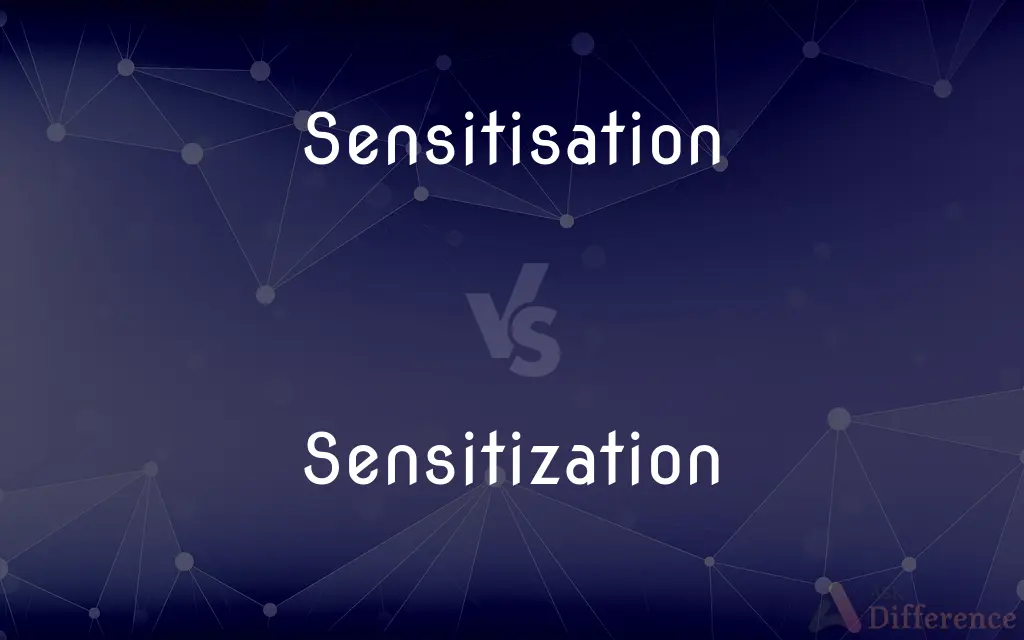Sensitisation vs. Sensitization — What's the Difference?
By Tayyaba Rehman & Urooj Arif — Updated on April 16, 2024
Sensitisation and sensitization refer to the same process of becoming increasingly responsive to a stimulus, with the primary difference being regional spelling preferences: 'sensitisation' is preferred in British English, while 'sensitization' is used i

Difference Between Sensitisation and Sensitization
Table of Contents
ADVERTISEMENT
Key Differences
Sensitisation is commonly used in British English to describe the process of becoming more responsive or sensitive to a particular stimulus over time. Whereas, sensitization follows the same definition but conforms to American English spelling conventions.
The spelling sensitisation often appears in UK-based scientific literature, academic texts, and medical journals. On the other hand, sensitization is predominantly found in American publications and is the spelling adopted by international standards like the American Psychological Association.
In educational settings in the UK, sensitisation is taught as the correct form, reinforcing regional spelling norms. Meanwhile, in the US, students learn to use sensitization, aligning with American orthographic practices.
When using software or online platforms, sensitisation might be flagged as a misspelling in settings configured for American English. Conversely, sensitization might be similarly flagged in software set to British English.
In global communication, it’s important to be aware of these differences to ensure clarity. For instance, a British researcher writing for an international journal might opt for sensitization to conform to the publication's style guidelines.
ADVERTISEMENT
Comparison Chart
Spelling
Sensitisation
Sensitization
Usage in Academia
Preferred in UK institutions
Preferred in US institutions
Online Spell Check
Correct in UK settings
Correct in US settings
International Journals
May adapt to American spelling
Generally uses American spelling
Literature Presence
Common in UK texts
Common in US texts
Compare with Definitions
Sensitisation
Used to describe heightened reactions in immune responses.
The patient's sensitisation to the drug complicated treatment.
Sensitization
Pertains to learning and behavioral science.
The study explored sensitization to stress in urban environments.
Sensitisation
A process of becoming more sensitive to a substance.
Repeated exposure led to sensitisation to the allergen.
Sensitization
The process by which exposure to a stimulus enhances response to a subsequent stimulus.
Sensitization occurred after repeated exposure to the chemical.
Sensitisation
Incremental increase in response to a repeated stimulus.
The lab animals showed sensitisation after several tests.
Sensitization
Common in discussions of allergies and autoimmune diseases.
Sensitization to peanuts can be severe and life-threatening.
Sensitisation
Often involves environmental or contextual factors.
Her sensitisation to noise grew worse in crowded spaces.
Sensitization
Becoming increasingly reactive to a particular antigen.
Sensitization to pollen can worsen over seasons.
Sensitisation
Can refer to psychological conditioning.
He developed a sensitisation to anxiety triggers.
Sensitization
Involves psychological and physiological changes.
Sensitization to caffeine reduced his sleep quality.
Sensitisation
(British spelling) sensitization
Sensitization
The state of being sensitive (as to an antigen)
Sensitisation
The state of being sensitive (as to an antigen)
Sensitization
Sensitization is a non-associative learning process in which repeated administration of a stimulus results in the progressive amplification of a response. Sensitization often is characterized by an enhancement of response to a whole class of stimuli in addition to the one that is repeated.
Sensitisation
(psychology) the process of becoming highly sensitive to specific events or situations (especially emotional events or situations)
Sensitization
To make sensitive
"Solitude had sensitized him to the roughness of other people" (Jeffrey Eugenides).
Sensitisation
Rendering an organism sensitive to a serum by a series of injections
Sensitization
To make (a film or plate) sensitive to light, especially to light of a specific wavelength.
Sensitization
To make hypersensitive or reactive to an antigen, such as pollen, especially by a second or repeated exposure.
Sensitization
To become sensitive or hypersensitive.
Sensitization
The process of making something sensitive.
Sensitization
(psychology) the process of becoming highly sensitive to specific events or situations (especially emotional events or situations)
Sensitization
Rendering an organism sensitive to a serum by a series of injections
Common Curiosities
How is 'sensitization' used in medical contexts?
His sensitization to the medication necessitated a change in treatment.
Can sensitisation happen with non-allergic stimuli?
Yes, sensitisation can occur with any repeated stimulus, not just allergens.
How do British journals handle the term sensitization?
They may adapt the spelling to sensitisation unless adhering to specific style guides.
Does the meaning of sensitisation change in different contexts?
The core meaning remains the same, but the context can highlight different aspects of responsiveness.
What does sensitization mean?
Sensitization refers to the same process as sensitisation, but it is the preferred spelling in American English.
Are sensitisation and sensitization interchangeable?
Yes, they are interchangeable terms with spelling differences based on British and American English conventions.
How do I use 'sensitisation' in a sentence?
Her sensitisation to sunlight became apparent during the summer.
What fields use the term sensitization?
Similar to sensitisation, it is used across various scientific disciplines.
Can software correct the spelling of sensitisation/sensitization?
Yes, depending on the language setting, software can correct to either British or American spelling.
Why does the spelling of sensitisation/sensitization differ?
The spelling difference is a result of varying orthographic conventions between British and American English.
What is sensitisation?
Sensitisation is the process of becoming more responsive to a certain stimulus, particularly used in British English.
Is sensitization recognized globally?
While recognized globally, the spelling might be adapted depending on the regional language standards.
How should I spell sensitisation/sensitization in academic papers?
Spell according to the style guide and audience of the publication.
What fields use the term sensitisation?
It is used in medicine, psychology, and environmental science, among others.
What is a common mistake when using sensitisation/sensitization?
A common mistake is using the incorrect regional spelling for the intended audience.
Share Your Discovery

Previous Comparison
Remarkable vs. Uncanny
Next Comparison
Contact vs. HitAuthor Spotlight
Written by
Tayyaba RehmanTayyaba Rehman is a distinguished writer, currently serving as a primary contributor to askdifference.com. As a researcher in semantics and etymology, Tayyaba's passion for the complexity of languages and their distinctions has found a perfect home on the platform. Tayyaba delves into the intricacies of language, distinguishing between commonly confused words and phrases, thereby providing clarity for readers worldwide.
Co-written by
Urooj ArifUrooj is a skilled content writer at Ask Difference, known for her exceptional ability to simplify complex topics into engaging and informative content. With a passion for research and a flair for clear, concise writing, she consistently delivers articles that resonate with our diverse audience.














































